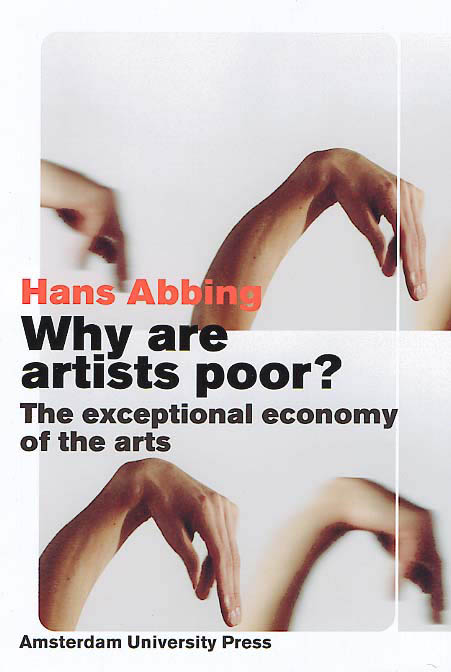Hans Abbing: Why Are Artists Poor? The Exceptional Economy of the Arts (2002)
Filed under book | Tags: · aesthetics, art, art criticism, art history, economics, gift economy, market, money, netherlands

“Most artists earn very little. Nevertheless, there is no shortage of aspiring young artists. Do they give to the arts willingly or unknowingly? Governments and other institutions also give to the arts, to raise the low incomes. But their support is ineffective: subsidies only increase the artists’ poverty.
The economy of the arts is exceptional. Although the arts operate successfully in the marketplace, their natural affinity is with gift-giving, rather than with commercial exchange. People believe that artists are selflessly dedicated to art, that price does not reflect quality, and that the arts are free. But is it true?
This unconventional multidisciplinary analysis explains the exceptional economy of the arts. Insightful illustrations from the practice of a visual artist support the analysis.”
Publisher Amsterdam University Press, 2002
Open access
ISBN 9053565655, 9789053565650
367 pages
PDF (updated on 2019-12-12)
Comments (3)Johan Söderberg: Hacking Capitalism. The Free and Open Source Software Movement (2007)
Filed under book | Tags: · capitalism, filesharing, floss, free software, gift economy, hacker culture, hacking, intellectual property, open source, software

The Free and Open Source Software (FOSS) movement demonstrates how labour can self-organise production, and, as is shown by the free operating system GNU/Linux, even compete with some of the worlds largest firms. The book examines the hopes of such thinkers as Friedrich Schiller, Karl Marx, Herbert Marcuse and Antonio Negri, in the light of the recent achievements of the hacker movement. This book is the first to examine a different kind of political activism that consists in the development of technology from below.
Publisher Routledge, 2007
Volume 9 of Routledge research in information technology and society
ISBN 0415955432, 9780415955430
252 pages
PDF (updated on 2016-1-16)
Comments (3)Christian Fuchs: Internet and Society. Social Theory in the Information Age (2007)
Filed under book | Tags: · collaboration, facebook, gift economy, information technology, internet, mass media, myspace, neoliberalism, politics, technology, virtual communities, youtube

In this study, Christian Fuchs discusses how the internet has transformed the lives of human beings and social relationships in contemporary society. By outlining a social theory of the internet and the information society, he demonstrates how the ecological, economic, political, and cultural systems of contemporary society have been transformed by new ICTs. Fuchs highlights how new forms of cooperation and competition are advanced and supported by the internet in subsystems of society and also discusses opportunities and risks of the information society.
Publisher Routledge, 2007
ISBN 0415961327, 9780415961325
398 pages

